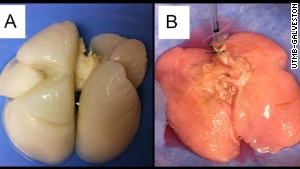(CNN) -- For the first time, scientists have created
human lungs in a lab -- an exciting step forward in regenerative
medicine, but an advance that likely won't help patients for many years.

"It's so darn cool," said
Joan Nichols, a researcher at the University of Texas Medical Branch.
"It's been science fiction and we're moving into science fact."
If the lungs work -- and
that's a big if -- they could help the more than 1,600 people awaiting a
lung transplant. Lungs are one of many body parts being manufactured in
the lab -- some parts, such as tracheas and livers, are even further
along.
"Whole-organ engineering
is going to work as a solution to the organ donor shortage," said Dr.
Stephen Badylak, deputy director of the McGowan Institute for
Regenerative Medicine at the University of Pittsburgh.

Image A is before new cells were reseeded. The finished product is image B.
The researchers in
Galveston, Texas, started with lungs from two children who'd died from
trauma, most likely a car accident, Nichols said. Their lungs were too
damaged to be used for transplantation, but they did have some healthy
tissue.
They took one of the lungs and stripped away nearly everything, leaving a scaffolding of collagen and elastin.
The scientists then took
cells from the other lung and put them on the scaffolding. They immersed
the structure in a large chamber filled with a liquid "resembling
Kool-Aid," Nichols said, which provided nutrients for the cells to grow.
After about four weeks, an engineered human lung emerged.
Repeating the process, they created another lung from two other children who'd died.
The lab-made lungs look very much like the real thing, Nichols says, just pinker, softer and less dense.
Nichols said she thinks it will be another 12 years or so until they'll be ready to try using these lungs for transplants.
"My students will be doing the work when I'm old and retired and can't hold a pipette anymore," she said.
Before researchers experiment on humans, they'll try out lab-made lungs on pigs, she said.
Doctors have already had success transplanting patients with synthetic tracheas. The first procedure was done in 2011, and since then, six more have been done.
Two of the patients have
died of causes unrelated to their tracheas, said David Green, CEO of
Harvard Apparatus Regenerative Technology, which makes equipment used to
make engineered body parts.
No comments:
Post a Comment